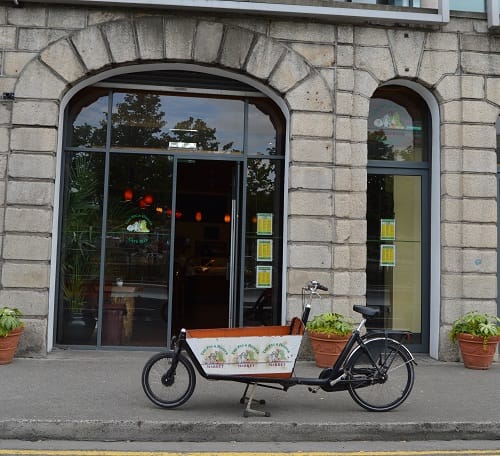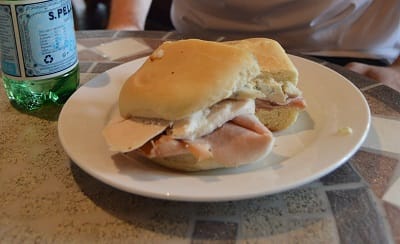What’s the best way to tell area residents about plans for a new asylum shelter nearby?
The government should tell communities directly about plans for new asylum shelters, some activists and politicians say.
At 28, independent Dublin City Councillor Gary Gannon is still trying to find his way, politically. At the Pig and Heifer, he talks about issues from housing to abortion, and about his ambitions.

Just after two o’clock on Friday afternoon, the cool and airy Pig and Heifer on City Quay is a welcome relief from the humidity outside. The high-ceilinged, New York-style deli is quiet, except for a couple other patrons.
Independent Dublin City Councillor Gary Gannon sits at one of the wooden tables across the red tiled floor. He leans against the stiff, leather chair – also red – with his phone in hand. He has just finished a shift in his family’s pub around the corner.
It is Gannon’s first time here too – he admits he is more likely to buy a roll to take away from a local shop – but the Pig and Heifer comes highly recommended by one of his brothers. It is certainly more stylish than most delis, with shelves of wine lining the far wall.
We go to the counter to order; behind the glass there is beef, pastrami, tuna, salami, chorizo, lamb, bacon, salmon and various types of chicken, ham and cheese. A huge range of vegetarian options are available too – and even sauerkraut.

I order a cajun chicken sandwich from the menu: spicy chicken, lettuce, peppers, onions and melted Swiss cheese (€5.50). Gannon ventures off the menu and points out the fillings for a soft roll: chicken, ham and gorgonzola cheese (also €5.50).
We settle down at the table once again. “There’s all sorts of different meats up there; I love it,” comments Gannon.
Finally – to a soundtrack featuring Robbie Williams, Rihanna, Tracy Chapman and some jazz interludes – we get to the politics.
Gannon explains some of the difficulties he had adjusting to his new role: “Initially it was ridiculously difficult, because I didn’t know who I was trying to be . . . My politics, in many ways, were not formed yet.”
Without the support of a party, everything down to finding the photocopier was harder in the beginning. “I mean, there’s nobody to show you anything. There’s nobody to discuss your ideas with,” he says.
Gannon considered joining a political party, and continues to consider it. For a while he even interned with Sinn Féin Senator David Cullinane, whom he admires. But after having conversations with a number of parties, he still feels he doesn’t quite fit with any one of them.
“I wanted to run on my own principles, not be defined by others,” says Gannon.
Though he knows that, as an independent, he won’t be able to effect change on the issues that he comes across most – housing, for example – he is not ready to join a party yet, because he is still questioning his own politics and forming his views through working within his community.
“I’m 28 now, I probably didn’t read the front of a newspaper ’til I was about 21,” he explains.
Gannon became interested in social issues while taking part in the Trinity Access Programme, a year-long foundation course that led to him completing a bachelor’s degree in history and politics.
He became a youth worker and an employment advocate for early school-leavers. This exposed him to a culture of deprivation about which he concluded “a lot of it is enforced from the top”.
But it was actually the inaction of past councillors that motivated Gannon to join the council. Two years ago, Dublin City Council announced that it would not be collecting illegally dumped waste in Gannon’s area for some weeks. After councillors failed to help, he decided he could do a better job.
“I am quite confrontational at times,” he says.
Ah, a fiery redhead, I think.
He continues: “I suppose I ran for election to get myself involved in the debate and to challenge those that I didn’t feel were worthy of the position they were holding,” he says.
He pauses.
“This is the slowest I’ve ever eaten a sandwich,” he notes. “The gorgonzola is amazing.”
The cajun chicken is going down well too; it’s not too spicy, but is awkward to eat when you’re trying to professionally interview a councillor – there’s chicken everywhere.

I take this opportunity to take a photograph of the councillor, as well as his sandwich before it is eaten. He laughs. “Ah I’m going to look like a prick with my Pellegrino. You should have told me this was happening.”
Standing for election last year, Gannon never thought he would succeed the first time around, but he won over voters in Dublin’s North Inner City during what he describes as the most stressful period of his life.
He acknowledges the help he received from friends and family, calling the first of his two electoral strategies Operation Tina. “My mother’s a very popular woman around Dublin 1,” he explains. The second strategy was simply to knock on doors and introduce himself to as many people as possible.
Though it took Gannon some time to adjust to constantly being called by people with really difficult problems and serious worries, now he particularly enjoys helping out young constituents with advice on student grants and college choices.
He aspires to be a TD, because many of the issues he’s most interested are best addressed at a national level: housing, unemployment, the decriminalisation of drug use, the repeal of the Eighth Amendment.
As well as dealing with those who are living on the street, Gannon also deals with a less prominent type of housing insecurity: overcrowding. Sometimes he encounters situations in which upwards of eight people are living in one small flat.
“People get in touch with me and they are sharing rooms with their uncles,” he says. “It’s enormously mentally straining for people who find themselves in that situation.”
Comparing some of the current living conditions in the city to the tenements of the early 1900s, he calls the situation “shameful”.
But do councillors have the power to effect change on these issues? Probably not. Gannon believes councillors’ powers are very limited, while the city manager has too much power.
“It’s an illusion of democracy at times,” he says. “And it’s like, who in the name of jaysus elected the city manager? Because I didn’t.”
For the moment, Gannon is positive about his future in politics, but says that if he reaches a point where he doesn’t feel he is making a difference, he will try his hand at something else.